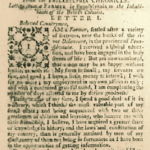 Sometimes, I wonder about the internet. Having done all those Google searches on Colonial America, they have found me, and articles are popping up on my feed. I recently shared an article on Facebook about the actions Parliament took following the Boston Tea Party in December 1773.
Sometimes, I wonder about the internet. Having done all those Google searches on Colonial America, they have found me, and articles are popping up on my feed. I recently shared an article on Facebook about the actions Parliament took following the Boston Tea Party in December 1773.
Sign of Nine Stripes, my upcoming book, doesn’t extend that far, occurring in 1769-1770. While it hadn’t reached the fervor of the later Acts, discontent was brewing even then. But what was to come after was met with more significant opposition. Was the internet telling me I needed to finish the story?
Following the Seven Year’s (French & Indian) War, Britain was broke and turned to her colonies for funds. Parliament believed the colonies should pay for the recent wars “fought on their behalf.” The colonists felt this was a land grab between France and England and had nothing to do with them, so why should they pay for it? The Stamp Act of 1765 was passed, then repealed in 1766. However, this was followed by the Townshend Acts, which went much deeper.
While the colonists objected to those acts, the thought of independence was on the minds of few. Even Benjamin Franklin, who argued that the colonies needed to work together, didn’t argue for independence at that point. As things grew worse, however, that began to change. Protests and boycotts became more frequent, and smuggling was the way to make money.
The first significant event was an altercation between some young men in Boston and British soldiers on 5 March 1770. Now referred to as the Boston Massacre, this began when a handful of unruly Boston youth began taunting and throwing snowballs at a young private. When he jabbed at them with his bayonet, they started hurling stones and shells. As you can imagine, things escalated. Soldiers arrived, and other locals and a brawl began. Suddenly several shots rang out, killing five and wounding six colonists. That was when opinions began to change.
By late 1773, the taxes on the colonists had increased considerably, especially on tea. The Americans felt it was unfair to be taxed without any representation in Parliament. Who was looking out for their interests back home? Smuggling became even more prevalent, and prominent individuals such as John Hancock and Samuel Adams encouraged the populace to boycott tea sold by the British East India Company. Not to mention these two men were smugglers themselves. The colonists continued to protest the tea tax and Parliament’s control over their right to govern themselves.
A group of dissidents known as the Sons of Liberty grew out of the 1765 Stamp Act, which had taxed all paper goods. Their efforts were effective, and the act was repealed the following year. Over time, this group appeared as needed. They urged protests and boycotts. This organization was back in action following Parliament’s passage of the Tea Act in May 1773.
 This group of revolutionists numbered several prominent citizens, such as Benedict Arnold, Patrick Henry, Paul Revere, Samuel Adams, and John Hancock. Led by Adams, the Sons of Liberty staged protests on Griffin’s Wharf in Boston when the British East India Company’s ship, Dartmouth, arrived. The men took action when she was followed by sister ships, Beaver and Eleanor, all loaded with tea.
This group of revolutionists numbered several prominent citizens, such as Benedict Arnold, Patrick Henry, Paul Revere, Samuel Adams, and John Hancock. Led by Adams, the Sons of Liberty staged protests on Griffin’s Wharf in Boston when the British East India Company’s ship, Dartmouth, arrived. The men took action when she was followed by sister ships, Beaver and Eleanor, all loaded with tea.
On the night of 16 December 1773, a large group of men dressed as Native Americans boarded the three ships and dumped 342 chests of tea into the water. It took three hours to open and empty each bin. Besides breaking a padlock, no further damage was done, and the men swept the decks before departing. Only one man, Francis Akeley, was apprehended.
An outraged Britain took prompt action and passed the Coercive Acts, often referred to as the Intolerable Acts, in retribution. Essentially, these acts closed the Boston harbor, ended the Massachusetts Constitution and free election of officials, moved judicial authority to Britain, which created martial law in the colony, and required colonists to quarter British soldiers on demand.
While this was aimed at Boston, it affected the entire colony of Massachusetts and caused a stir among the other colonies. Each wondered if this could happen to them. Britain most likely hoped these acts would end the rebellion. However, it had the opposite effect and strengthened the colonists’ resolve.
 This led to the First Continental Congress held on 5 September 1774 at the newly built Carpenter’s Hall in Philadelphia. Twelve of the colonies sent their representatives, with only Georgia abstaining. By the end of October, they agreed on the following:
This led to the First Continental Congress held on 5 September 1774 at the newly built Carpenter’s Hall in Philadelphia. Twelve of the colonies sent their representatives, with only Georgia abstaining. By the end of October, they agreed on the following:
Censure and the repeal of the Coercive Acts
Boycotting British goods
Right of the colonies to govern themselves
Formation and training of a colonial militia
And you know what happened next…
